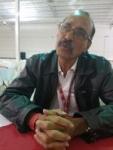 There are 500 delegates from more than 100 political organizations in the Americas here at the São Paolo Forum being held this year in San Salvador. Yesterday at the opening session I found myself seated next to Julio Molina, a delegate from the Farabundo Martí National Liberation Front (FMLN) of the host country, El Salvdor. We introduced ourselves and when the session ended went out to talk about our mutual interest in history.
There are 500 delegates from more than 100 political organizations in the Americas here at the São Paolo Forum being held this year in San Salvador. Yesterday at the opening session I found myself seated next to Julio Molina, a delegate from the Farabundo Martí National Liberation Front (FMLN) of the host country, El Salvdor. We introduced ourselves and when the session ended went out to talk about our mutual interest in history.
While I am a historian, Julio dedicates himself to preserving the “historic memory” of the generation that was involved in the 12-year civil war that took place here from 1980 to 1992 between the rightwing government of the oligarchy and the revolutionaries of the FMLN. “We have many tasks today,” he says, “but one of them is the preservation of the historic memory.” Now 65, he was himself part of that struggle, having fought for nine years with the FMLN guerrilla army and, after military ranks were established in 1984, having become a captain.
“The word ‘history’ comes from the Greek, meaning ‘to see’,” he tells me. “We have here many still living who were there, who saw, and we have to preserve that historic memory.” He dedicates himself to interviewing FMLN survivors of the civil war alive today, but, he tells me, he only interviews those who came from his own political organization because he believes that others from other groups will have reservations and may not be forthcoming.
The FMLN, he explains to me, was a front made up of many different political parties of the left that had arisen after the so-called “Football War” between El Salvador and Honduras that broke out on July 14, 1969. The Communist Parties of both El Salvador and Honduras supported their respective governments in the war, leading to the break up of those parties as small groups disgusted with the old leadership left and formed new left organizations. Within a decade those organizations turned to the strategy of guerrilla warfare, followed as well by the Communist Party of El Salvador.
Julio joined one of the new political organizations, the Popular Forces of Liberation Farabundo Martí (FPL), and became a guerrilla fighter. He felt then and believes today that the FPL was a group with a revolutionary ethical compass.
The United States supported the Salvadoran government, providing millions in military assistance, but the war dragged to a stalemate. Finally, in January of 1992, the Chapultepec Peace Accords were signed in Mexico City. With a new framework for political democracy, the FMLN entered electoral politics and Muricio Funes was elected president in 2009. Today Fumes’ vice-president, Salvador Sánchez Cerén, another FMLN guerrilla leader, is president.
Julio tells me that while the various political tendencies that formed the FMLN may not formally exist anymore, people feel very loyal to those with whom they fought and worked politically. He believes that President Sánchez Cerén has done well in office, especially in taking on one of the country’s most difficult problems today: the maras. Maras are the criminal gangs that originated among Central American immigrants in the United States; when the gang members were deported, they set up organizations in their home countries of Guatemala, Honduras, and El Salvador selling drugs, engaging in prostitution, and defending their businesses against rivals and the government with high-powered weapons. The Mara Salvatrucha is perhaps the largest and certainly the most famous of the gangs. The gangs’ internecine warfare has made El Salvador one of the world’s deadliest places.
The difficulties facing El Salvador, says Julio, are great. The tide seems to be turning in Latin America as left governments have lost elections in Argentina or been removed by the courts as in Brazil. But Julio has great confidence in the president Sánchez Cerén, who was one of the members of the FPL and who he believes still has a revolutionary ethos. “The most important thing,” he says, “is the moral force which attempts to make revolutionary thinking into reality.”


Leave a Reply